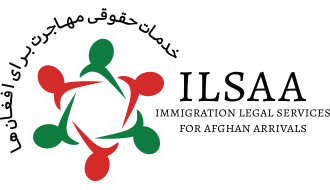ILSAA Stories
Read stories about ILSAA from Afghan clients, attorneys, and others.

At ILSAA, we are inspired by listening to stories about the Afghan immigrants we serve and the dedicated members of our legal and support teams. Meet some of these people below, and learn how, together, we are helping to enrich the American tapestry.
Names and locations have been changed to protect privacy.
Sayed: From Afghan Journalist to Green Card Applicant
Sayed, a tall man in his 30s, who was a journalist in Afghanistan, entered the United States with his wife and two children in 2021. After settling in a rural area, the family was able to obtain asylum status without too much trouble.
His difficulties navigating the U.S. immigration legal system began when the family moved to a large city, and he tried to apply for a green card—which, compared to asylum, can be a much longer and more complex application process.
Sayed faced problems common to Afghan immigrants: he needed help identifying which documents he needed, translating the forms, and even just knowing what to do first. He knew he needed legal assistance but wasn’t sure where to turn. “I did not know any friends in the new city, so I had a lot of problems,” said Sayed. “I contacted six or seven different offices to help me, and, unfortunately, they didn’t respond."
Then, an Afghan acquaintance told him about free legal services available through ILSAA, a program funded by the Office of Refugee Resettlement to provide immigration legal services to eligible Afghans in the United States. The friend told Sayed that ILSAA had helped many Afghans and characterized their services as “very good.” Sayed was skeptical. “I thought, ‘Maybe it’s possible or maybe it’s impossible…but I will send ILSAA my information.’”
Sayed got a pleasant surprise. “ILSAA responded after only one day!”
Once he had been found eligible for ILSAA support, Sayed was paired with an immigration lawyer. Sayed’s lawyer walked him through the application process, helping him gather and translate the necessary documents, answering his questions, and pre-registering Sayed at an upcoming free ILSAA legal clinic.
Because ILSAA provides services in Dari and Pashto, the two most common Afghan languages, Sayed’s lawyer was able to communicate with him in his native language. "Sometimes my English wasn’t good,” he said, “so they switched to Dari. They made it easy for me to understand the documents.”
When the date of the ILSAA legal clinic arrived, Sayed was ready: pre-screened, pre-registered, and all of the necessary documents had been collected. This preparation helped make it easier for the volunteer lawyers at the clinic to prepare Sayed’s final green card application and submit it to USCIS.
“It took a long time to arrive to that point,” said Sayed, “but it was a very important day for me.”
Ahmad: Finding Legal Help Along the Immigration Journey
Ahmad, a dark-haired man in his early thirties, who had been an Airforce pilot in Afghanistan, arrived in the United States in spring 2022. He was on his own, separated from his wife and three children, who remained in Afghanistan.
During his first months in the United States, Ahmad moved among short-term accommodations with friends. He struggled to find an affordable place to live and a job that paid him enough.
When it came time to file for asylum, Ahmad sought assistance at local resettlement agencies. Due to heavy caseloads, they were unable to help him at the time. He looked into hiring a private attorney but found he could not afford it.
“I called three or four attorneys,” he said, “and they told me it would be $350 an hour. But how can I pay $350 an hour when I don’t have anything in my pocket?”
Ahmad felt some urgency to file for asylum status because he knew the sooner he was granted asylum, the sooner he could file for family reunification. So, he watched a few instructional videos and attempted to complete the application by himself.
Unfortunately, as he said, “There were too many mistakes.” The application had been pending for 17 months when, through word of mouth, he heard about ILSAA, which provides free immigration legal services to eligible Afghans in the United States. Ahmad contacted ILSAA, and following an intake interview to determine his eligibility, his case was assigned to an ILSAA attorney.
Ahmad’s ILSAA attorney refiled his asylum case, starting again at the beginning. “They corrected all my mistakes. After they re-submitted my case to USCIS, my lawyer even went with me to the interview,” he related.
Being granted asylum was a significant milestone for Ahmad but just one step on a longer immigration journey—and his ILSAA attorney was able to help him progress. Being apart from his children is a difficult situation for Ahmad. In February, his attorney filed a family reunification application to bring Ahmad’s wife and children to the United States. In August, ILSAA helped him submit his green card application. Both applications are currently pending, and Ahmad's lawyer stays in touch, letting him know about any case updates.
“I didn’t try to do it myself,” he laughs. “I said to myself, ‘From now on I will not do anything without an attorney! Even if I get a stop sign ticket, I have to get an attorney!’”
Overcoming Communication Barriers to Ensure Access to Services
When an Afghan couple arrived in the United States, they faced significant communication challenges. They were both deaf, could not speak, and had no understanding of American Sign Language (ASL).
After working with a non-ILSAA attorney and completing two US Citizenship and Immigration Services (USCIS) interviews, they received a request for additional information which required a response in a limited time, or their case would be denied. In the summer of 2024, they came to ILSAA for assistance.
ILSAA (working on behalf of the Office of Refugee Resettlement) provides legal services to Afghan arrivals who are eligible to come to the United States under the umbrella of Operation Allies Welcome. This initiative works to safely resettle vulnerable Afghans in the United States, including those who assisted the US in Afghanistan.
From the initial interview, it was clear to the couple’s new ILSAA attorney that the clients required a different approach to interpretation support to meet their unique needs and to assist with more accurate communication. Together, ILSAA language services staff and the ILSAA attorney began exploring other interpretation options.
After talking with several interpreter agencies and dozens of companies and organizations working with the Deaf community, ILSAA found an innovative sign language interpretation company. The company recommended using a dyad approach that had worked with other clients from Afghanistan and surrounding countries.
The dyad method involves using two interpreters, an American Sign Language Interpreter (SLI) and a Certified Deaf Interpreter (CDI). CDIs are specialists who are Deaf individuals and utilize ASL along with visual and tactical communication forms. The attorney speaks to the SLI, the SLI signs to the CDI, and the CDI communicates to the client, and vice versa. Critical to this method is the initial meeting where the CDI and client spend 30 minutes establishing a communication baseline and a shared vocabulary of signs to ensure they can communicate effectively with each other.
During the first meeting, it quickly became clear that this was the right communication method for the clients. “You could just tell this was working—it was like a light went on,” said the ILSAA attorney. The couple began communicating back and forth with the ILSAA attorney using the dyad method, allowing them to explain their situation and receive advice about the relevant legal processes.
Since that initial meeting, the outlook has brightened for the couple. The ILSAA attorney filed a response to USCIS’s request and filed an additional application based on information obtained through accurate interpretation.
“As somebody who has worked with Afghan immigrants pre-ILSAA, I have to say that the ILSAA program has been a game-changer,” the ILSAA attorney said. “The interpretation services and all the other supports provided through ILSAA—it’s been great for these clients.”
Partnering to Help Afghans: Spotlight on the Legal Clinic
In August 2024, Immigration Legal Services for Afghan Arrivals (ILSAA), hosted a no-cost in-person adjustment of status ("green card") legal clinic for Afghan asylees at ICF’s Reston, Virginia, headquarters. ILSAA (working on behalf of the Office of Refugee Resettlement) provides legal services to Afghan arrivals who are eligible to come to the United States under the umbrella of Operation Allies Welcome. Over a whirlwind four days, 96 green card applications were completed and prepped for submission to U.S. Citizenship and Immigration Services (USCIS).
The green card application is 20 pages and can be complicated and time-consuming to complete. In addition to the application itself, each applicant must present between 20 to 80 pages of supporting documents and evidence. For most people, completing the application without legal assistance presents a challenge, and for Afghan asylees, many of whom do not speak English fluently (or at all) and are unfamiliar with American legal norms, access to legal and language assistance is critical.
Hosting a green-card legal clinic provided an effective solution to these challenges, giving multiple Afghan clients the opportunity to complete their applications in a single session, saving them repeated, potentially costly, visits to attorneys’ offices. This kind of concentrated impact could only have happened in a clinic setting, where all the necessary legal expertise and supporting resources could be gathered and deployed in one place.
Ensuring a successful clinic required weeks of intensive preparation and a collaborative effort involving several organizations in the ILSAA network. These organizations included REACT DC, USCRI, VECINA, and ICF, all of whom have extensive experience in providing legal, resettlement, and/or project management support to Afghan immigrants.
Afghan clients in the DC-metro area signed up for the clinic through a local ILSAA affiliate whose in-house legal team had been working on their asylum cases. Once the clients were signed up, ILSAA worked with them to collect supporting documentation ahead of time to ensure the smoothest possible process on site. Senior ILSAA attorneys provided legal advice and oversight to the 15-20 daily legal volunteers at the clinic who provided the bulk of the direct client interaction.
The volunteers were lawyers from large firms who provided pro-bono hours as part of their bar requirements, in addition to paralegals and law students. Because the volunteers were not immigration attorneys, ILSAA provided educational modules, printed packets, and on-site orientations to train them in completing green card applications. To assist in bridging language barriers, ILSAA’s Dari and Pashto interpreters were on site at the clinic with each lawyer-client pair and interpreting throughout the lengthy process. Augmenting all the legal activity was a team of ILSAA staff members, working both on-site and ahead of time to take care of logistics, scheduling, and coordination among various participants.
In the end, all 96 applications were completed and mailed to USCIS as a result of the clinic. ILSAA’s project manager said, “The Reston clinic was a life-changing event for almost 100 Afghans. In one fell swoop, we were able to further the goals of Operation Allies Welcome and help eligible Afghan arrivals achieve permanent residence. To accomplish all that in such a compressed window of time was truly a team effort, reflecting the many dedicated people and organizations in the ILSAA network.”
